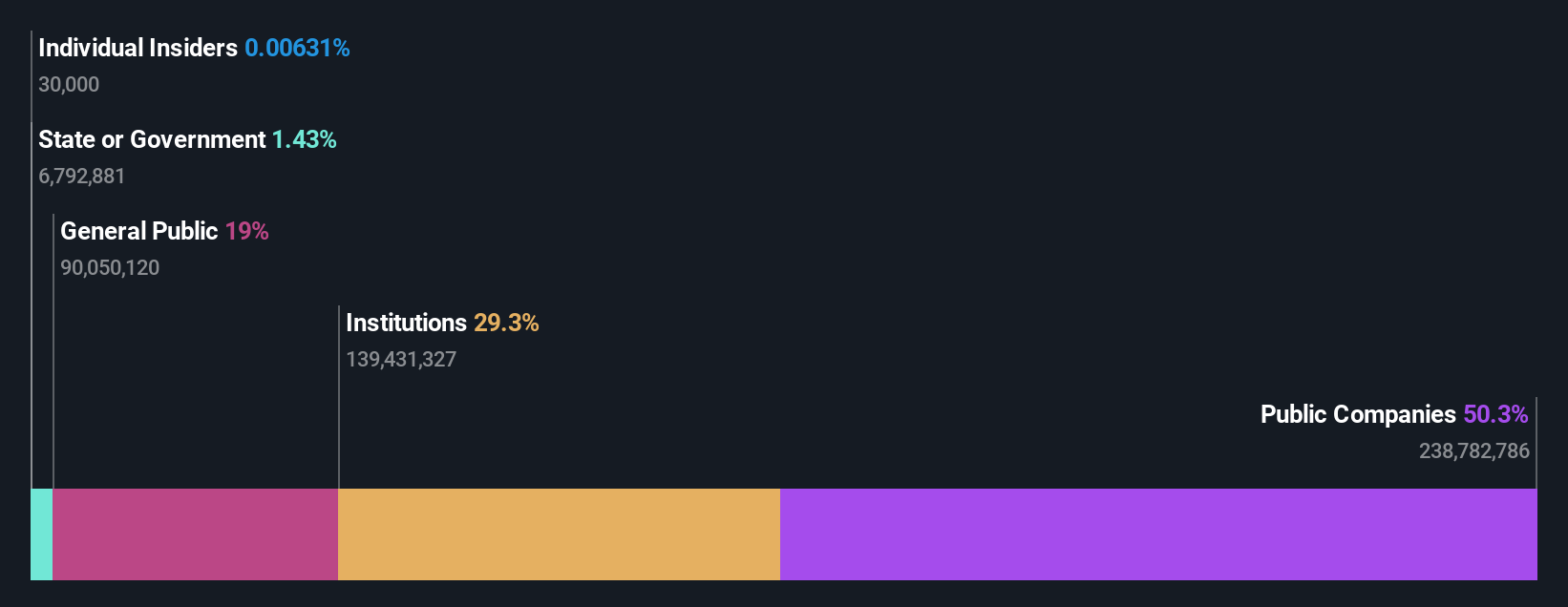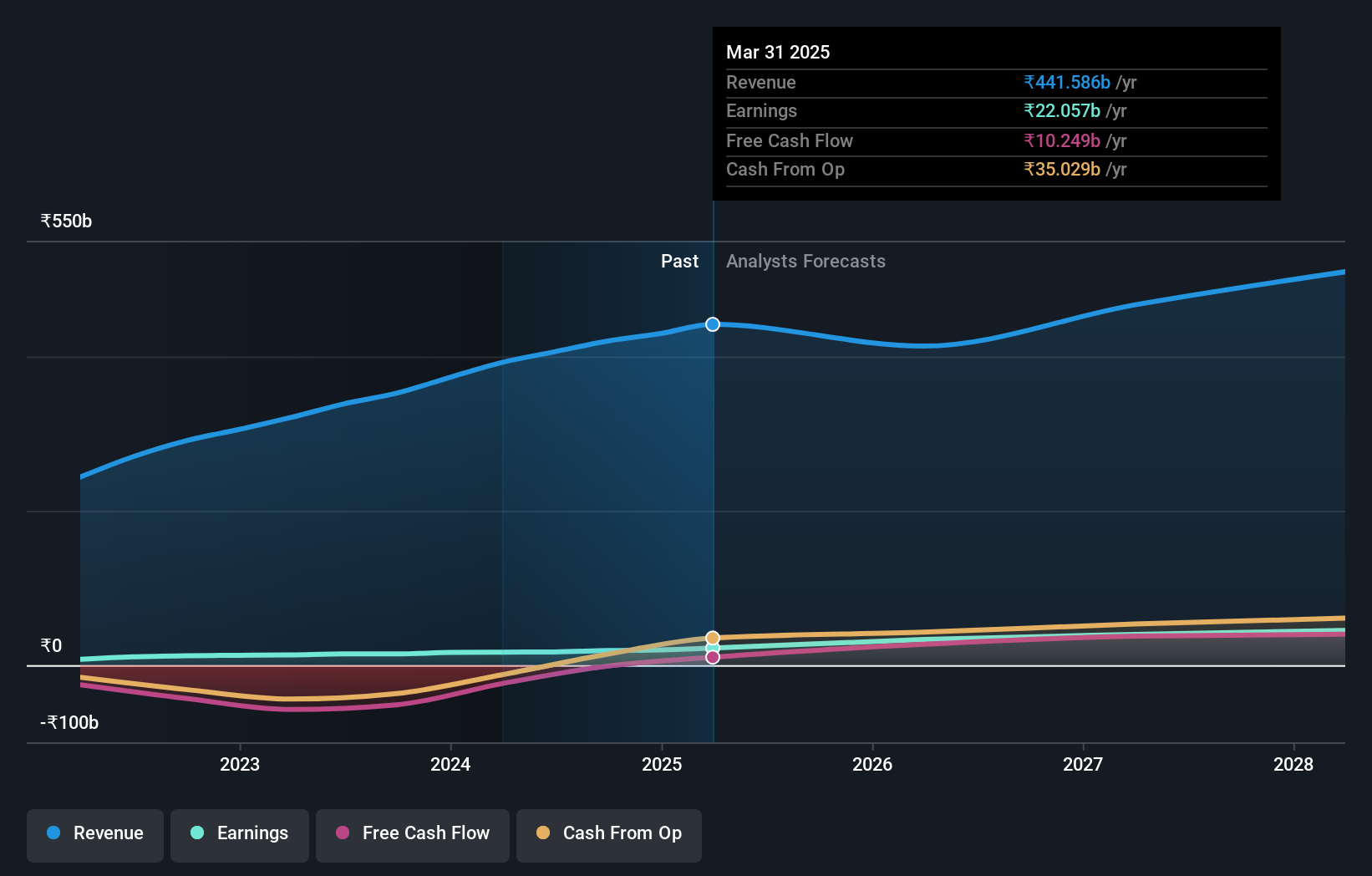Institutions along with public companies who hold considerable shares inTVS Motor Company Limited (NSE:TVSMOTOR) come under pressure; lose 4.4% of holdings value
Key Insights
- TVS Motor's significant public companies ownership suggests that the key decisions are influenced by shareholders from the larger public
- TVS Holdings Limited owns 50% of the company
- Institutions own 29% of TVS Motor
Every investor in TVS Motor Company Limited (NSE:TVSMOTOR) should be aware of the most powerful shareholder groups. The group holding the most number of shares in the company, around 50% to be precise, is public companies. Put another way, the group faces the maximum upside potential (or downside risk).
While institutions who own 29% came under pressure after market cap dropped to ₹1.3t last week,public companies took the most losses.
Let's delve deeper into each type of owner of TVS Motor, beginning with the chart below.
Check out our latest analysis for TVS Motor

What Does The Institutional Ownership Tell Us About TVS Motor?
Many institutions measure their performance against an index that approximates the local market. So they usually pay more attention to companies that are included in major indices.
TVS Motor already has institutions on the share registry. Indeed, they own a respectable stake in the company. This implies the analysts working for those institutions have looked at the stock and they like it. But just like anyone else, they could be wrong. If multiple institutions change their view on a stock at the same time, you could see the share price drop fast. It's therefore worth looking at TVS Motor's earnings history below. Of course, the future is what really matters.

Hedge funds don't have many shares in TVS Motor. The company's largest shareholder is TVS Holdings Limited, with ownership of 50%. With such a huge stake in the ownership, we infer that they have significant control of the future of the company. Meanwhile, the second and third largest shareholders, hold 7.3% and 2.5%, of the shares outstanding, respectively.
While it makes sense to study institutional ownership data for a company, it also makes sense to study analyst sentiments to know which way the wind is blowing. Quite a few analysts cover the stock, so you could look into forecast growth quite easily.
Insider Ownership Of TVS Motor
While the precise definition of an insider can be subjective, almost everyone considers board members to be insiders. Company management run the business, but the CEO will answer to the board, even if he or she is a member of it.
I generally consider insider ownership to be a good thing. However, on some occasions it makes it more difficult for other shareholders to hold the board accountable for decisions.
Our data suggests that insiders own under 1% of TVS Motor Company Limited in their own names. Being so large, we would not expect insiders to own a large proportion of the stock. Collectively, they own ₹83m of stock. In this sort of situation, it can be more interesting to see if those insiders have been buying or selling.
General Public Ownership
With a 19% ownership, the general public, mostly comprising of individual investors, have some degree of sway over TVS Motor. While this group can't necessarily call the shots, it can certainly have a real influence on how the company is run.
Public Company Ownership
We can see that public companies hold 50% of the TVS Motor shares on issue. It's hard to say for sure but this suggests they have entwined business interests. This might be a strategic stake, so it's worth watching this space for changes in ownership.
Next Steps:
It's always worth thinking about the different groups who own shares in a company. But to understand TVS Motor better, we need to consider many other factors. Be aware that TVS Motor is showing 2 warning signs in our investment analysis , and 1 of those is a bit concerning...
Ultimately the future is most important. You can access this free report on analyst forecasts for the company.
NB: Figures in this article are calculated using data from the last twelve months, which refer to the 12-month period ending on the last date of the month the financial statement is dated. This may not be consistent with full year annual report figures.
Valuation is complex, but we're here to simplify it.
Discover if TVS Motor might be undervalued or overvalued with our detailed analysis, featuring fair value estimates, potential risks, dividends, insider trades, and its financial condition.
Access Free AnalysisHave feedback on this article? Concerned about the content? Get in touch with us directly. Alternatively, email editorial-team (at) simplywallst.com.
This article by Simply Wall St is general in nature. We provide commentary based on historical data and analyst forecasts only using an unbiased methodology and our articles are not intended to be financial advice. It does not constitute a recommendation to buy or sell any stock, and does not take account of your objectives, or your financial situation. We aim to bring you long-term focused analysis driven by fundamental data. Note that our analysis may not factor in the latest price-sensitive company announcements or qualitative material. Simply Wall St has no position in any stocks mentioned.
About NSEI:TVSMOTOR
TVS Motor
Engages in the manufacture and sale of automotive vehicles and components, spare parts, and accessories in India.
Solid track record with moderate growth potential.
Similar Companies
Market Insights
Community Narratives




